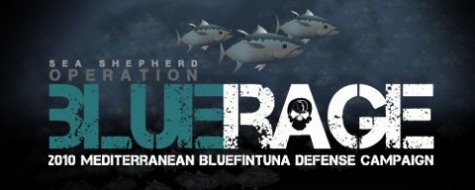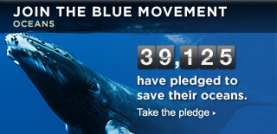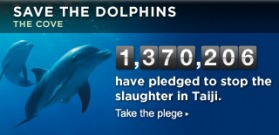This past week I had the opportunity to meet up with my favorite Ocean-defenders, The Sea Shepherd Conservation Society, as their flagship vessel, the Steve Irwin, scored rock star parking in the picturesque Bay of Cannes, France. Amongst the multi-million dollar yachts that create the backdrop of the prestigious annual film festival, the notorious "pirate" ship lurked silently in the distance proudly flying it's token emblem, the Jolly Roger, while the volunteer crew of international citizens waited with anticipation to embark upon their latest eco-crusade: Operation Blue Rage.
Unlike their winter migratory route from Australia to the treacherous southern ocean to defend whales from illegal Japanese commercial whaling operations, this season's campaign may offer somewhat more forgiving terrain and conditions, however the mission at hand is equally monumental; to save the critically endangered bluefin tuna from the escalating threat of extinction. Extinction, as in banished from the Earth - FOREVER.
Earlier this year, conservationist officials from the United States and EU met in Qatar to pass and implement a global ban on the trade of bluefin tuna. However, the motion was rejected as nations including Indonesia, Canada and Japan- the largest global consumers of bluefin- argued more sustainable industry management practices in the future. Environmental scientists were disappointed and remain deeply concerned by the decision as research studies indicate that bluefin stocks have fallen by approximately 85% since the era of industrial fishing began.
Once aboard the mighty black ship, I paid a visit to everybody's favorite Eco-guerriere, Captain Paul Watson, who spoke candidly to me about the urgency of the situation facing the bluefin and the necessity of immediate direct action to protect the species from the greedy culprit of overfishing.
Deborah: What is the current status of the bluefin tuna? How did it get to this critical point?
CPW: The bluefin tuna should have been listed by CITES (Convention on International Trade in Endangered Species) as endangered but CITES has tossed out science as the criteria for listing and has replaced it with politics and economics. The BFT is in trouble an could be extinct within a few years. Continued exploitation of the BFT is ecologically irresponsible. But with a price of over 100K on it’s head, the days are numbered for this unique species. Mitsubishi is literally investing in extinction – the more BFT they can catch and store in refrigerated warehouses, the more diminished the populations in the wild and diminishment translates into increased valuable of the dead BFT in the warehouses. I call this the politics of extinction.
Deborah: Can you please briefly explain the law of diminishment and how it is relevant to the current state of the Ocean?
CPW: The first law of ecology is the law of diversity, the second law is the law of interdependence and the third law is that of finite resources or a limit to growth and a limit to carrying capacity. Diminishment of numbers within a species leads to diminishment of species and diminishment of species leads to diminishment of interdependence between species and thus leads to reduced carrying capacities. Removal of one species leads to consequences to other species and thus to consequences to ourselves.
Deborah:What could potentially happen if an apex predator like the blue fin tun were to go extinct?
CPW: Removal of predators does have consequences. The present rate of diminishment of all fish species is going to bear negative consequences for the entire oceanic eco-system.
Deborah: What is the aim of Sea Shepherd's recently launched campaign, Operation Blue Rage?
CPW: The aim of OBR is (1) to uphold international conservation law by intervening against illegal fishing activities, (2) to physically free and protect BFT caught illegally (3) to focus international media attention on the need to protect and conserve BFT and (4) to motivate other NGO’s and governments to take action to protect BFT.Deborah: How can the average person help to curb the rapid loss of this species?
CPW: We need to stop eating the oceans which means we need to stop eating fish and we need to stop feeding fish to domesticated animals like pigs, chickens, cats and salmon. We need work to get international conservation laws upheld and enforced. Governments must become more aggressive and tougher in upholding laws and NGO’s need to become more hands-on and more motivated.
The blue fin, weighing up to 1,500 lbs, are caught and transported to "open water" ranches where they are fed and fattened up in order to increase their value. While fisherman argue that these methods are both sustainable and ethical, critics like the Sea Shepherds, argue against these practices and maintain that there is a severe lack of accurate data over quotas and how many are actually taken each year. Some scientist predict that at the current rates, the bluefin could be extinct in as little as 3 years. "The quotas that have been set during the fishing season are unrealistic - these fish simply can't replace themselves at the rate they are being removed," noted Steve Irwin Quartermaster, Tim Webber. "We cannot wait any longer for the powers that be to get it together and deal with this dire situation. Direct action is needed now and that is what Sea Shepherd does best."
The significant role that the bluefin plays in local economies certainly up the stakes and potential risks for the Shepherds. Regardless, they remain steadfast in their mission to Defend, Conserve, Protect. Veteran Crew member, Shannon Mann adds, "We are at a tipping point. By losing top predators, such as sharks and bluefin tuna, the entire delicate balance of the ocean eco-system is severely disrupted and will inevitably lead to the overall collapse of a healthy, living, Ocean. There is no time to hesitate on this matter."
As I departed the Steve Irwin on a small zodiac back to the allure of the Canne's social scene, I caught a glimpse of the flag of the 5 Iroquois Nation flying humbly, yet boldly, from the main mast of the Steve Irwin and I was reminded of a Native American proverb:
"Only when the last tree has died, the last river has been poisoned and the last fish has been caught, will we realize that we cannot eat money."
No one seems to understand this notion better than Captain Paul Watson and his fearless crew who are ready to risk it all for the survival of a species- ultimately our own. To follow Operation Blue Rage and to learn more about the plight of the bluefin, please visit: http://www.seashepherd.org/blue-rage
Unlike their winter migratory route from Australia to the treacherous southern ocean to defend whales from illegal Japanese commercial whaling operations, this season's campaign may offer somewhat more forgiving terrain and conditions, however the mission at hand is equally monumental; to save the critically endangered bluefin tuna from the escalating threat of extinction. Extinction, as in banished from the Earth - FOREVER.
Earlier this year, conservationist officials from the United States and EU met in Qatar to pass and implement a global ban on the trade of bluefin tuna. However, the motion was rejected as nations including Indonesia, Canada and Japan- the largest global consumers of bluefin- argued more sustainable industry management practices in the future. Environmental scientists were disappointed and remain deeply concerned by the decision as research studies indicate that bluefin stocks have fallen by approximately 85% since the era of industrial fishing began.
Once aboard the mighty black ship, I paid a visit to everybody's favorite Eco-guerriere, Captain Paul Watson, who spoke candidly to me about the urgency of the situation facing the bluefin and the necessity of immediate direct action to protect the species from the greedy culprit of overfishing.
Deborah: What is the current status of the bluefin tuna? How did it get to this critical point?
CPW: The bluefin tuna should have been listed by CITES (Convention on International Trade in Endangered Species) as endangered but CITES has tossed out science as the criteria for listing and has replaced it with politics and economics. The BFT is in trouble an could be extinct within a few years. Continued exploitation of the BFT is ecologically irresponsible. But with a price of over 100K on it’s head, the days are numbered for this unique species. Mitsubishi is literally investing in extinction – the more BFT they can catch and store in refrigerated warehouses, the more diminished the populations in the wild and diminishment translates into increased valuable of the dead BFT in the warehouses. I call this the politics of extinction.
Deborah: Can you please briefly explain the law of diminishment and how it is relevant to the current state of the Ocean?
CPW: The first law of ecology is the law of diversity, the second law is the law of interdependence and the third law is that of finite resources or a limit to growth and a limit to carrying capacity. Diminishment of numbers within a species leads to diminishment of species and diminishment of species leads to diminishment of interdependence between species and thus leads to reduced carrying capacities. Removal of one species leads to consequences to other species and thus to consequences to ourselves.
Deborah:What could potentially happen if an apex predator like the blue fin tun were to go extinct?
CPW: Removal of predators does have consequences. The present rate of diminishment of all fish species is going to bear negative consequences for the entire oceanic eco-system.
Deborah: What is the aim of Sea Shepherd's recently launched campaign, Operation Blue Rage?
CPW: The aim of OBR is (1) to uphold international conservation law by intervening against illegal fishing activities, (2) to physically free and protect BFT caught illegally (3) to focus international media attention on the need to protect and conserve BFT and (4) to motivate other NGO’s and governments to take action to protect BFT.Deborah: How can the average person help to curb the rapid loss of this species?
CPW: We need to stop eating the oceans which means we need to stop eating fish and we need to stop feeding fish to domesticated animals like pigs, chickens, cats and salmon. We need work to get international conservation laws upheld and enforced. Governments must become more aggressive and tougher in upholding laws and NGO’s need to become more hands-on and more motivated.
The blue fin, weighing up to 1,500 lbs, are caught and transported to "open water" ranches where they are fed and fattened up in order to increase their value. While fisherman argue that these methods are both sustainable and ethical, critics like the Sea Shepherds, argue against these practices and maintain that there is a severe lack of accurate data over quotas and how many are actually taken each year. Some scientist predict that at the current rates, the bluefin could be extinct in as little as 3 years. "The quotas that have been set during the fishing season are unrealistic - these fish simply can't replace themselves at the rate they are being removed," noted Steve Irwin Quartermaster, Tim Webber. "We cannot wait any longer for the powers that be to get it together and deal with this dire situation. Direct action is needed now and that is what Sea Shepherd does best."
The significant role that the bluefin plays in local economies certainly up the stakes and potential risks for the Shepherds. Regardless, they remain steadfast in their mission to Defend, Conserve, Protect. Veteran Crew member, Shannon Mann adds, "We are at a tipping point. By losing top predators, such as sharks and bluefin tuna, the entire delicate balance of the ocean eco-system is severely disrupted and will inevitably lead to the overall collapse of a healthy, living, Ocean. There is no time to hesitate on this matter."
As I departed the Steve Irwin on a small zodiac back to the allure of the Canne's social scene, I caught a glimpse of the flag of the 5 Iroquois Nation flying humbly, yet boldly, from the main mast of the Steve Irwin and I was reminded of a Native American proverb:
"Only when the last tree has died, the last river has been poisoned and the last fish has been caught, will we realize that we cannot eat money."
No one seems to understand this notion better than Captain Paul Watson and his fearless crew who are ready to risk it all for the survival of a species- ultimately our own. To follow Operation Blue Rage and to learn more about the plight of the bluefin, please visit: http://www.seashepherd.org/blue-rage

 RSS Feed
RSS Feed

















